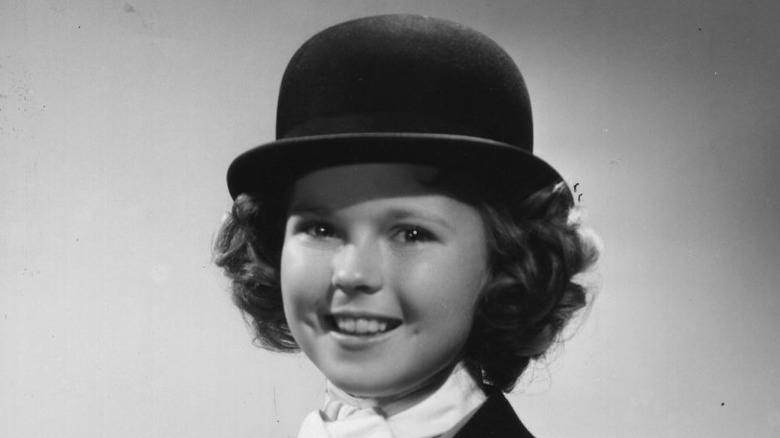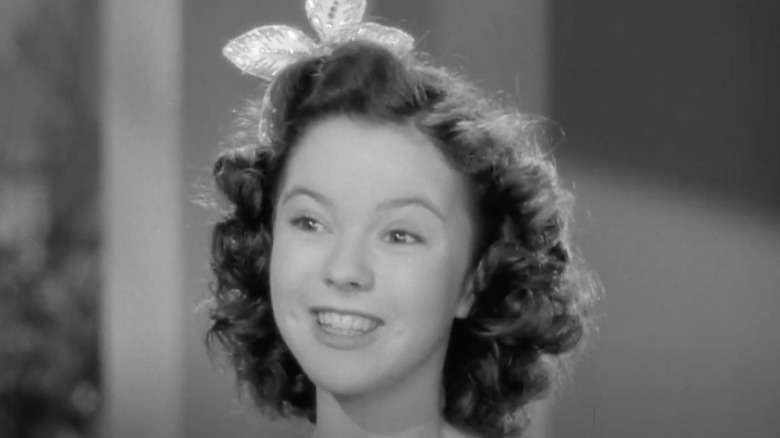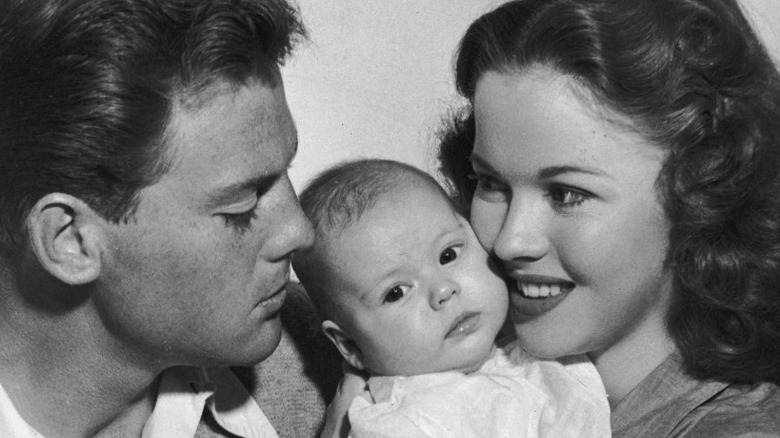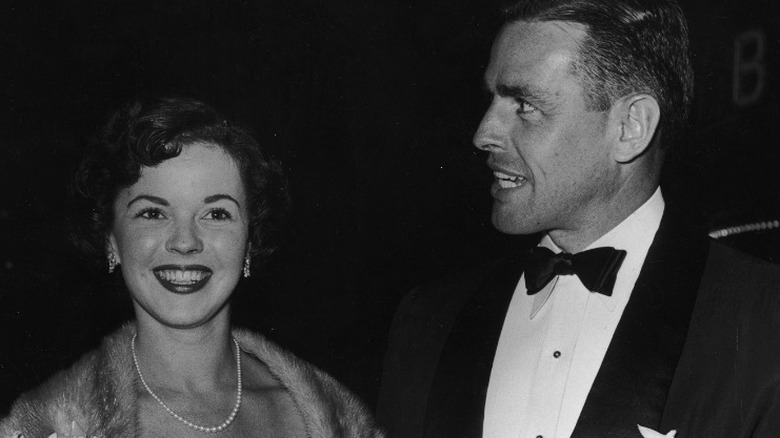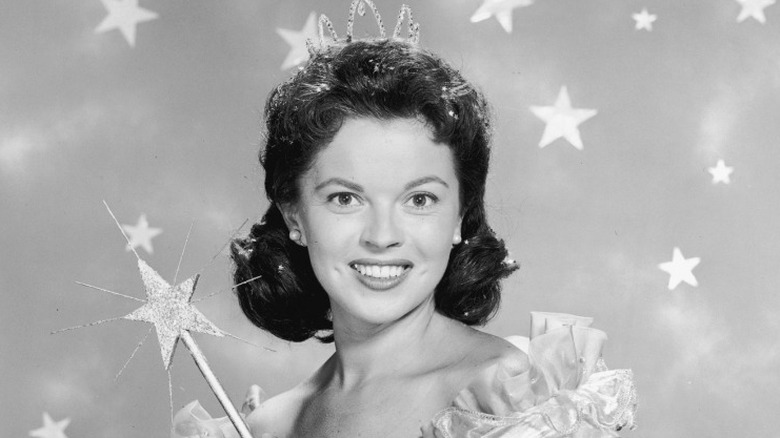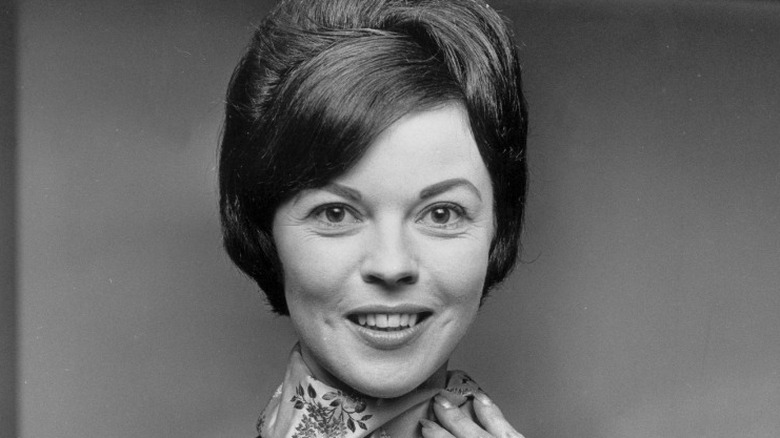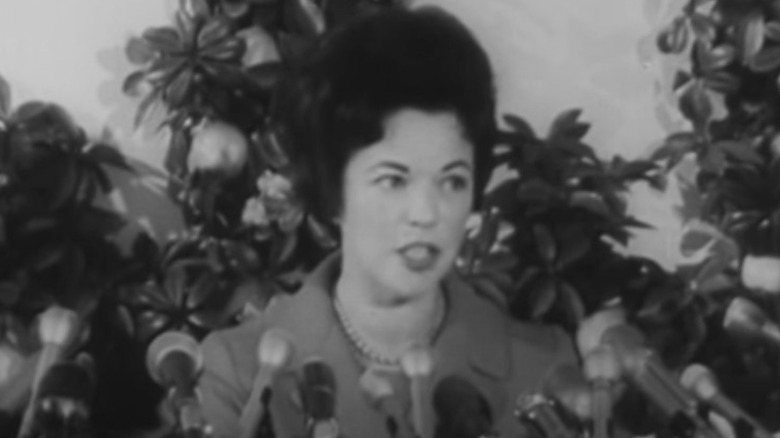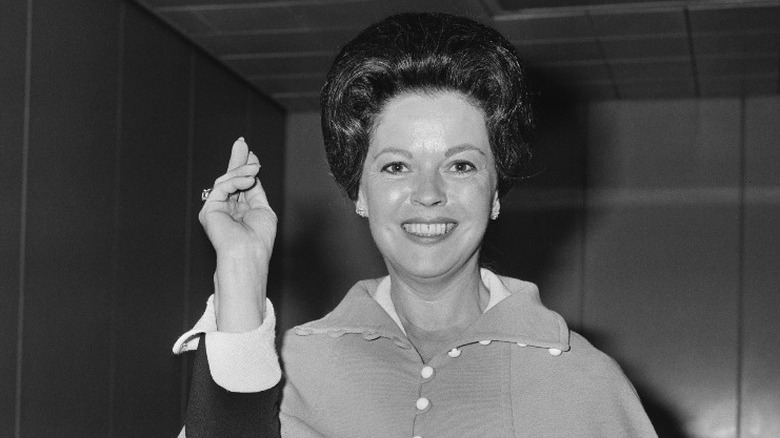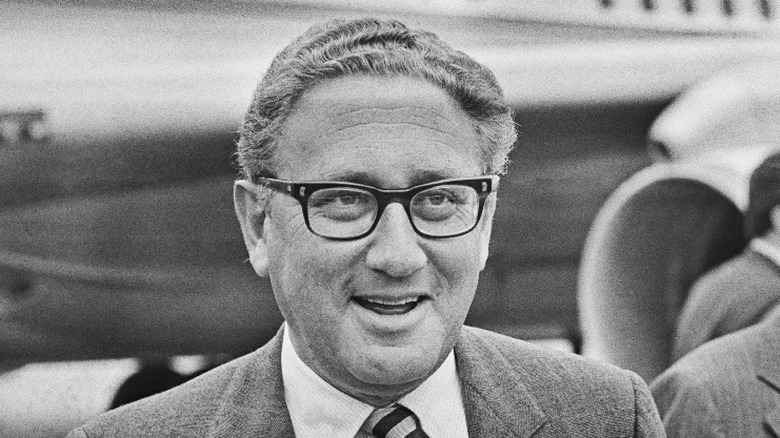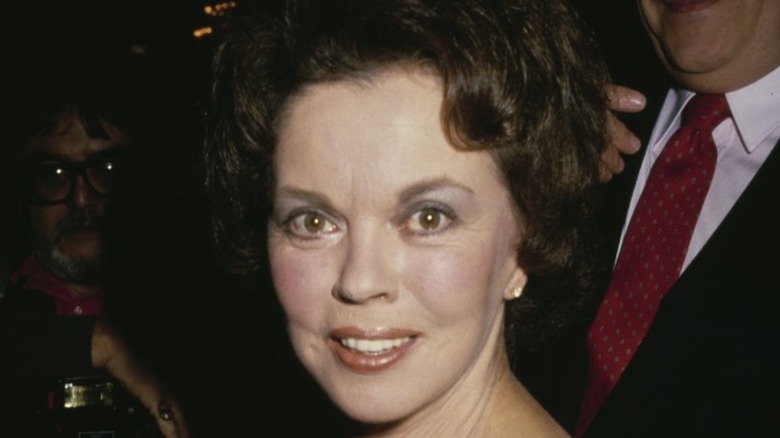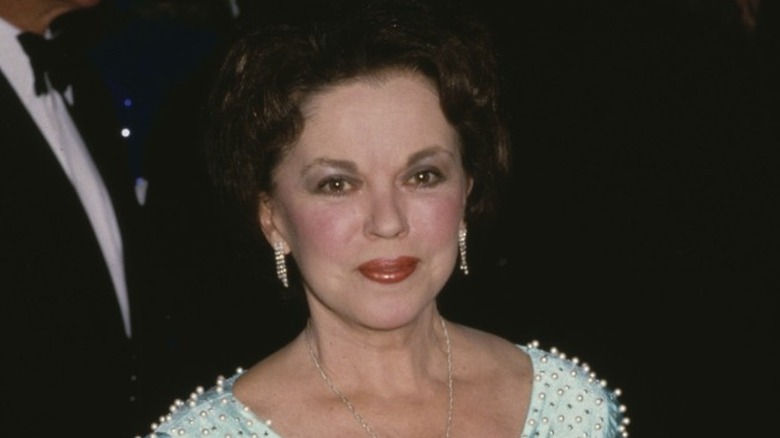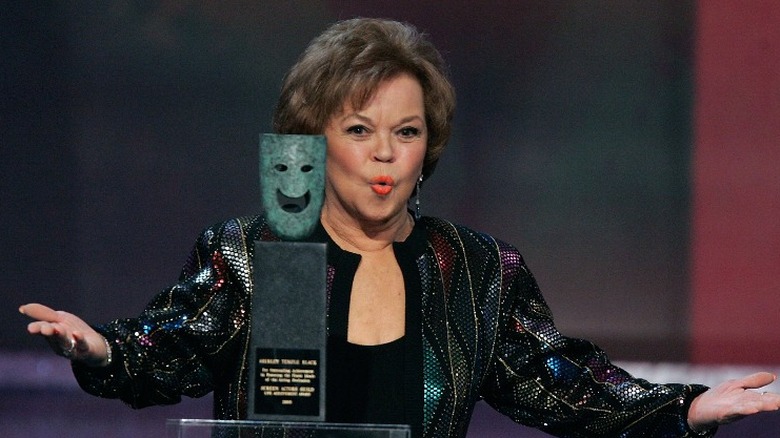Whatever Happened To Shirley Temple After Stardom?
Shirley Temple, "Little Miss Miracle" herself, was the original Hollywood child megastar. Her trademark curls and irresistible on-screen charm helped ease the collective suffering of The Great Depression. As Franklin D. Roosevelt once quipped, "As long as we have Shirley Temple, we will be alright" (via Hollywood Reporter). However, like so many subsequent child stars, she had difficulty maintaining a show business career beyond her initial triumphs.
A volatile first marriage and losing plum roles to the likes of Judy Garland would've certainly derailed a lesser talent. But Temple's brief but wildly successful childhood movie run was merely the launching point for a prolific career as a diplomat, political activist, and public servant spanning many decades. These days, how many kid actors get a tasty mocktail named after them and then end up as the US Ambassador to Ghana? Let's take a deeper dive into this American film icon's fascinating post-Hollywood life of achievement.
She still acted as a teenager
When her acting career was at its peak in the mid-1930s, Shirley Temple was the biggest box office draw in the country, helping to save 20th Century Fox from bankruptcy during The Great Depression (via Deadline). During this time, Temple starred in some of her most well-known movies, like "Curly Top," "Heidi," and "Wee Willy Winkie." However, as "little ray of sunshine" Temple approached adolescence, she was dropped by 20th Century Fox in 1940. That might have been the end of Temple's big-screen career, but she continued acting well into young adulthood.
While Temple's teenage movie appearances might not be as celebrated as her youthful performances, she was still a noted Hollywood player in the 1940s. After leaving 20th Century Fox, Temple starred in a series of films for various studios, including "Kathleen," "Miss Annie Rooney," and "I'll Be Seeing You." These films didn't have the cultural impact of her childhood movies, with the New York Times reviewing "Miss Annie Rooney" as a "grim little picture," but as she got older, Temple found work in celebrated films like the Academy Award-winning movie "The Bachelor and the Bobby-Soxer" and John Ford's "Fort Apache."
Her tumultuous first marriage at 17
Shirley Temple had been performing and working for most of her young life, and living at such an accelerated pace extended into her personal life. By the time Temple was approaching adulthood, she was a chain-smoking show business veteran, determined to be the first in her high school class to get engaged (via New York Times). Temple married US Army Air Corp sergeant John Agar in 1945 when she was just 17 years old, having met only months earlier through a mutual friend, actress ZaSu Pitts (via Washington Post). The handsome Agar, who had a middling interest in movie acting, took on the job after a lucrative offer from movie producer David O. Selznick. Temple and Agar would appear in two films together, "Fort Apache" and "Adventures In Baltimore," but their on-screen chemistry did not translate to their real-life relationship.
Temple and Agar projected a joyous image for the public, including welcoming daughter Linda Susan in 1948, but the reality of their marriage was much less idyllic. Agar struggled with alcohol abuse and was arrested for drunk driving. There were also issues of Agar's fidelity and unpredictably violent temper. Agar, a reluctant and insecure movie actor, lived in the shadow of his wife's mega-stardom, leading to the disdainful nickname "Mr. Shirley Temple" (via Washington Post). Ultimately, the couple divorced in 1949, and reportedly were estranged for the remainder of their lives (via Washington Post).
Temple's second marriage and retirement from acting
As Shirley Temple moved into young adulthood, her career was flailing, with film historian David Thomson observing that, after growing out of her bouncing blond curls into a more mature look, she had become an "unremarkable teenager" (via New York Times). By 1949, the public was losing interest in her films and Temple was losing a husband, divorcing John Agar by the end of that year. Temple's personal life rebounded when she met Charles Adlen Black, a US Naval officer, businessman, and avid surfer (via The Almanac). They met at a cocktail party, with Temple noting "I fell in love with him at first sight. It sounds corny, but that's what happened" (via Los Angeles Times). Less than 60 days after her divorce from Alden, Temple and Black got engaged and they married on December 6, 1950.
By the time Temple and Black married, Temple was finished with her movie career, her last film credit being 1949's "A Kiss for Corliss." Essentially retired from show business, Temple followed Black to Washington D.C. during the Korean War, where he was stationed at the Pentagon. Together, Temple and Black made a formidable couple, producing two children, son Charles Jr. and daughter Lori, with their marriage lasting almost 55 years.
She hosted a children's TV show
Shirley Temple might have made her last film appearance in the 1940s, but she wasn't quite done with show business. In the 1950s, television was becoming ubiquitous in American households and old movies often filled the airwaves. With a new generation rediscovering her films, Temple made a Hollywood comeback with the television show "Shirley Temple's Storybook," an anthology series that retold classic children's tales. Temple narrated and sometimes acted in "Storybook" episodes, her effervescent charm still intact. One critic noted of her "Storybook" performance, that Temple "could, if she wanted to, steal Christmas from Tiny Tim" (via Los Angeles Times).
"Shirley Temple's Storybook" ran from 1958 to 1961 on NBC and ABC, with many episodes filmed in color, making a uniquely rich television experience for its time. While NBC's first color broadcast was in 1954, color television sets weren't the norm for most consumers. Many viewers couldn't appreciate "Storybook" with its lush, vivid, and expensive productions. It wasn't until "Walt Disney's Wonderful World of Color" made its debut in September 1961 that color television ownership became a priority (per ThoughtCo), unfortunate timing for "Storybook" which aired its last episode in July 1961.
She was a champion for numerous charities
Shirley Temple's charitable heart was cultivated from a young age and flourished well into adulthood. As a child, Temple participated in charity fundraisers for organizations like the American Red Cross, performing in a radio benefit to help European war refugees (via Los Angeles Times). After her retirement from show business, Temple worked with a number of charities, focusing on health and the arts in the San Francisco area, including promoting the San Francisco International Film Festival (via New York Times).
Temple was heavily invested in her work championing a cure for Multiple Sclerosis. Her brother George was diagnosed with MS and Temple began her work with the Multiple Sclerosis Society in the 1950s, eventually becoming the organization's president in the 1960s (via Washington Post). She worked tirelessly for the Multiple Sclerosis Society, as well as the International Federation of Multiple Sclerosis Societies, an organization which she co-founded.
She ran unsuccessfully for U.S. Congress
Shirley Temple first became interested in politics when she moved to Washington D.C. with her husband Charles Alden Black in the early 1950s (via New York Times). After moving back to California, Temple decided to run as a Republican for US Congress in 1967 to take the seat left vacant by the death of Rep. J. Arthur Younger. Temple wasn't the first movie star to take on politics, and she found inspiration in the political careers of Hollywood hoofer-turned-Senator George Murphy and newly-elected California governor Ronald Reagan.
Temple, a late entry for the race, acknowledged that her congressional campaign would be an "uphill effort," but she was not deterred in her ambition to have a California congressional seat filled by a woman. When running for Congress, Temple said, "I think men are fine and here to stay, but I have a hunch that it wouldn't hurt to have a woman's viewpoint expressed in that delegation of 38 men" (via USA Today). Ultimately, Temple lost the election, with fellow Republican Pete McCloskey winning the seat.
She was a United States Ambassador to Ghana and Czechoslovakia
Consummate performer Shirley Temple took her public relations skills to the world's stage as a successful diplomat, serving in various capacities under four different presidents. Temple's diplomatic career kicked off when she was appointed as a delegate to the United Nations by President Richard Nixon in 1969. After her stint at the UN, she was appointed as US ambassador to Ghana by President Gerald Ford, a position she held from 1974–1976. During Ronald Reagan's administration in the 1980s, Temple worked for the State Department as a foreign-affairs officer expert (via Politico). Finally, President George H.W. Bush made Temple U.S. ambassador to Czechoslovakia from 1989–1992, a position she held until retiring from public service.
Temple's unorthodox diplomatic background meant she was unencumbered by traditional protocol, something that endeared her to locals. She immersed herself in local culture, winning praise during her time as Ghanian ambassador for proving "herself to be a capable, wonderful person who is determined to work for the good of others" and being a "charming lady, a family woman and an astute diplomat and ... entirely deserves her appointment" (via The Guardian). Her ambassadorship in Czechoslovakia occurred during that country's Velvet Revolution, demanding the end of communist rule. Temple, a champion of individual freedom, was praised for her diplomatic work in the country, with then-Secretary of State James Baker saying Temple was doing a "wonderful job."
Her rocky professional relationship with Henry Kissinger
Shirley Temple was no stranger to difficult men, something that followed her from the backlots of Hollywood to the mahogany-lined offices of Washington, D.C. At the time of Temple's diplomatic career, few women held ambassadorships, with the first female ambassador from the United States Helen Eugenie Anderson only being appointed in 1949, so it's not surprising that she faced an uphill, and sexist, battle to prove herself a worthy stateswoman. Temple's toughest diplomatic critic was then-Secretary of State Henry Kissinger. At a party, Kissinger was surprised to hear Temple intelligently discuss the country of Namibia, with Temple recounting to the AP that Kissinger was "surprised that I even knew the word." After being appointed the US Ambassador to Ghana, Kissinger said of Temple's new role that he wanted to "get movie stars into a position where they had to come when I called them, and now that I've solved the problem, I'm married."
It was a diplomatic misunderstanding between Temple and Kissinger that led to the end of her appointment as ambassador to Ghana. According to Vanity Fair, Temple called Kissinger to Ghana for a meeting, but the rulers of Ghana did not want to meet with Kissinger and he didn't want to meet with anyone but the country's leader. Ghanian leaders called off the meeting, leaving Kissinger upset and Temple without a job. Eventually, Kissinger would celebrate Temple for being "very intelligent, very tough-minded, very disciplined" (via New York Times), but as Vanity Fair notes, she probably didn't care for his praise.
She served on the board of directors for big companies
Shirley Temple learned her work ethic while working on film sets. She shared in her autobiography "Child Star"(via the New York Times) that punishments for misbehaving children on the soundstage were "profound and unforgettable. Time is money, Wasted time means wasted money means trouble." Temple evidently carried this lesson with her throughout life, becoming a valuable advisor to powerful and influential non-profit organizations and businesses.
Her involvement with the World Wildlife Federation spanned decades, starting in the 1940s as honorary chairman of Wildlife Week, then served on the WWF board of directors for several years in the 1970s. Although Temple never made movies for Walt Disney, she did serve on The Walt Disney Company's board of directors from 1974–1975. And surely it helped that Temple's husband Charle Aden Black once worked for Dole Hawaiian Pineapple (via The Almanac) when she joined the board of directors for Del Monte Foods, a company that grew the tasty fruits in Hawaii for decades.
Her breast cancer diagnosis raised public awareness of the disease
Not only was Shirley Temple a pioneering Hollywood entertainer and trailblazing female diplomat, but she was also an influential health advocate. When Shirley Temple was diagnosed with breast cancer in 1972, the disease was somewhat stigmatized. According to Time, breast cancer diagnoses often went undiscussed, both by patients and by medical professionals, with doctors obfuscating breast cancer procedures because they felt women couldn't handle it.
Temple defied these conventions when she publicly announced that she underwent a mastectomy. She even invited attention to her surgery by holding a televised press conference in her hospital room encouraging women to look after their own health (via Los Angeles Times). At the time of her surgery, Temple lamented lack of doctor-patient mastectomy consent, writing in McCall's, "The doctor can make the incision; I'll make the decision." Temple gained serious accolades for publicly sharing her breast cancer experience, receiving more than 50,000 letters of support. She maintained an even-keeled attitude toward her cancer, saying "I felt pretty good before the operation, and I felt good afterward," adding, "I just lost a good friend in between."
She sued over her namesake mocktail
Its origin story might be disputed — was it created at Chasen's, The Brown Derby, or The Royal Hawaiian hotel? — but there's no doubt that the Shirley Temple drink stands alone as the preferred non-alcoholic beverage choice for kids with discriminating taste. Made with ginger ale (or lemon-lime soda), a splash of grenadine, and playfully garnished with a maraschino cherry, the Shirley Temple is a sweet beverage treat that has endured for decades. But one person who was not a fan of the legendary mocktail was Shirley Temple herself. She referred disparagingly to the beverage as "saccharine" and "icky," and insisted that "she had nothing to do with it" (via NPR).
Even though she probably didn't unwind after a long day at work with her namesake drink, Temple didn't want businesses to exploit her name for their monetary gain. In the 1980s, Temple sued several companies that tried to sell drinks using the Shirley Temple name. She filed lawsuits against the companies Soda Pop Kids, Shirley's Temple, Inc., and Walkers International Specially Foods for marketing beverages using her name. Temple argued that Shirley T. Sparkling Soda and Original Shirley Temple Soft Drink were too close to her actual name, claiming "all a celebrity has is their name" (via New York Times). She told the Los Angeles Times of her legal battle "I really am a tigress when it comes to making sure that there is quality control with products that have my name on them."
Shirley Temple received many lifetime achievement awards
With a decades-long resume that included triumphs in a number of fields, it's no wonder Shirley Temple was showered with lifetime achievement awards in the latter part of her life.
Temple began racking up the Hollywood accolades as a child, earning a Juvenile Academy Award in 1935. Long after she left the Tinseltown spotlight for her work in global affairs, Temple received a number of prestigious honors celebrating her entertainment work. The National Board of Review gave Temple their Career Achievement Award in 1992, the Kennedy Center Honors bestowed her their rainbow-colored medal in 1998, and she accepted the Screen Actors Guild Lifetime Achievement Award in 2005. She remained such a beloved figure in 20th Century Fox's history that the studio erected a bronze statue of Temple on the Fox lot (via Deadline). Temple's advice for those who would also like to be honored with a lifetime achievement award? "Start early!"
